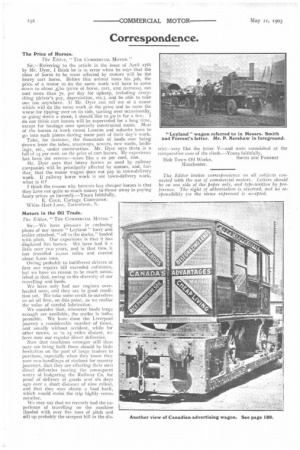Correspondence.
Page 20

If you've noticed an error in this article please click here to report it so we can fix it.
The Price of Horses.
The " THE COMMERCIAL MOTOR."
Sir,—Referring to the article in the issue of April 27th by Mr. Dyer, I think he is in error when he says that the class of horse to be most affected by motors will be the heavy cart horse. Before this animal loses his job, the price of a motor to do the same work will have to come down to about .L60 (price of horse, cart, and harness), not cost more than 7s. per day for upkeep, including everything (driver's pay, depreciation, etc.), and be able to take one ton anywhere. If Mr. Dyer can tell me of a motor which will do the same work at the price and be none the worse for tipping over on its side, turning over occasionally, or going down a shoot, I should like to go in for a few. I do not think cart horses will be superseded for a long time, except for haulage over specially constructed roads. Most of the horses at work round London and suburbs have to go into such places. during some part of their day's work.
Take, for instance, the thousands of loads now being drawn from the tubes, tramways, sewers, new roads, build'alp, etc., under construction. Mr. Dyer says there is a fall of is per cent. on the price of cart horses. My experience has been the reverse—more like a 20 per cent. rise. Mr. Dyer says that heavy horses as used by railway companies will be principally affected by motors, and, further, that the motor wagon does not pay in town-delivery work. If railway horse work is not town-delivery work, what is it?
I think the reason why brewers buy cheaper horses is that they have not quite so much money to throw away in paying fancy prices as formerly.—Yours faithfully,
E. COLE, Cartage Contractor. While Hart Lane, Tottenham, N.
Motors in the Oil Trade.
The Editor, •• TI-LE COMMERCIAL MOTOR."
Sir,—We have pleasure in enclosing photo of our steam " Leyland " lorry and trailer attached, "off to the docks," loaded with pitch. Our experience is that it has displaced five horses. We have had it a little over two years, and in that time it has travelled lo,000 miles and carried about 6,000 tons.
Owing probably to indifferent drivers at first our repairs bill exceeded estimates, but we have no reason to be much astonished at that, owing to the diversity of our travelling and loads.
We have only had our engines overhauled once, and they are in good condition yet. We take some credit to ourselves as an oil firm, on this point, as we realise the. value of careful lubrication.
We consider that, wherever loads large enough are available, the trailer is indispensable. We have done the Liverpool journey a considerable number of times, and usually without accident, while for other towns, to to 25 miles distant, we have now our regular direct deliveries.
Now that machines stronger still than ours are being built there should be little hesitation on the part of large traders to purchase, especially when they know they save two handlings at stations for country journeys, that they are effecting their own direct deliveries (saving the consequent worry of badgering the Railway Co. for proof of delivery of goods sent six days ago over a short distance of nine miles), and that they may obtain a load back, which would make the trip highly remunerative.
We may say that we recently had the experience of travelling on the machine (loaded with over five tons of pitch and oil) up probably the steepest hill in the dis trict—very like the letter V—and were astonished at the comparative ease of the climb.—Yours faithfully, Holt Town Oil Works, SMITH AND FORREST Manchester.
























